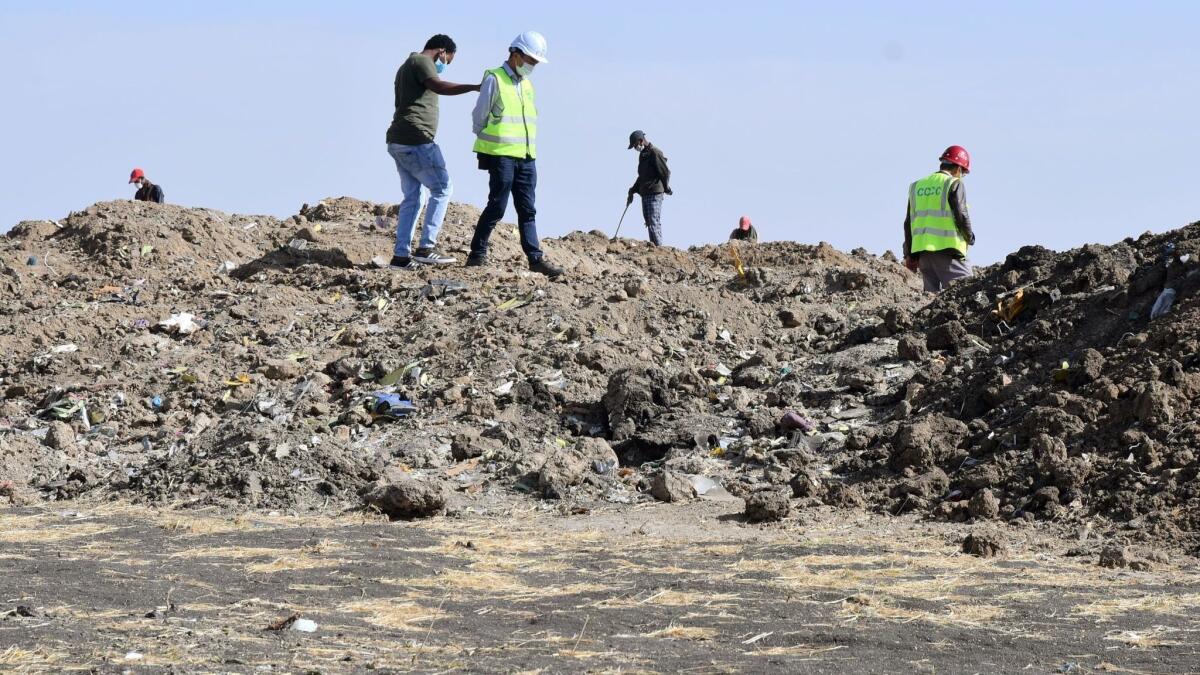Ethiopian pilot reported ‘flight-control problems’ before fatal Boeing 737 Max crash

- Share via
Ethiopian Airlines announced Wednesday that it would send the voice and data recorders from its ill-fated Flight 302 to be analyzed abroad, as more countries said they were banning planes of the same type from operating in their airspace.
The data from the two flight recorders, commonly known as the “black boxes,” are eagerly awaited as worry grows that the cause of Sunday’s crash could be related to an automated system aboard the Boeing 737 Max 8 aircraft that went down in Ethiopia minutes after taking off en route to Nairobi. The same type of plane also crashed shortly after takeoff in October in Indonesia.
After China grounded the plane on Monday, several countries followed suit, including much of Europe. The latest bans were issued by India, Egypt, Uzbekistan, Turkey and Hong Kong.
Ethiopian Airlines Chief Executive Tewolde Gebremariam told CNN on Tuesday that the pilot reported “flight-control problems” and asked to return to the airport.
Tewolde said that the boxes would be sent abroad “because we don’t have the equipment here” to analyze their data. The boxes could possibly go to the United States or to a European country closer to Ethiopia “in the interest of proximity and speed.” The decision will be made by the team investigating the crash.
While Tewolde of Ethiopian Airlines said the cause of the crash was not yet clear, he cast doubt on the airworthiness of the 737 Max.
“Two major fatal accidents on the same airplane model, brand new airplane model, in six months — so there are a lot of questions to be answered on the airplane,” he said.
In remarks to local media, Tewolde also revealed that pilots received additional training from Boeing to fly the 737 Max after an Indonesian domestic Lion Air flight crashed into the Java Sea shortly after takeoff last year.
“After the Lion Air crash, questions were raised, so Boeing sent further instructions that it said pilots should know,” he said, according to the Associated Press. “Those relate to the specific behavior of this specific type of aircraft. As a result, training was given by Boeing, and our pilots have taken it and put it into our manuals.”
Following the Indonesian crash, Boeing issued a bulletin warning about potential issues with an automated anti-stalling system on the 737 Max plane that could push the nose down.
The U.S. Federal Aviation Administration has stood by the embattled American airplane manufacturer and has said there is no basis for grounding the aircraft — a stand that has left the agency increasingly isolated.
According to flight tracking website Flightradar24, use of the 737 Max has plummeted around the world.
On Sunday, the day Flight 302 crashed outside Addis Ababa, killing all 157 passengers and crew on board, more than 1,250 Max 8 flights were tracked. That number had dropped to 718 by Tuesday and continued to decline Wednesday. Canadian and American carriers remain the last major airlines using the plane.
In both the Lion Air and Ethiopian Airlines crashes, the airplane immediately showed signs of trouble, with an erratic flight path that ascended and then descended before the airliner crashed minutes later.
More to Read
Inside the business of entertainment
The Wide Shot brings you news, analysis and insights on everything from streaming wars to production — and what it all means for the future.
You may occasionally receive promotional content from the Los Angeles Times.










